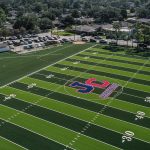Moody’s upgraded Topgolf’s debt ratings to reflect the recent improvement in liquidity due to $100 million of additional preferred equity with a commitment for another $80 million in preferred equity by the end of 2020. Additionally, the company received an amendment to obtain covenant relief from its lenders and a small shareholder loan was converted to preferred equity.
Moody’s said that while Topgolf will continue to be substantially impacted by COVID-19 and leverage is expected to increase further in the near term, it expects the enhanced liquidity will better position the company to manage through the impact of the pandemic. Future development of additional facilities is expected to slow after existing facilities under construction are completed to help manage liquidity.
Upgrades
- Probability of Default Rating, Upgraded to Caa2-PD from Caa3-PD
- Corporate Family Rating, Upgraded to Caa1 from Caa2
- Senior Secured Bank Credit Facility, Upgraded to Caa1 (LGD3) from Caa2 (LGD3)
- Outlook Actions:
Outlook
- Changed To Stable From Negative
Ratings Rationale
Moody’s said, “Topgolf’s Caa1 CFR reflects negative LTM EBITDA levels and very high leverage which Moody’s expects will deteriorate further in the near term, before improving in 2021 and 2022. All of Topgolf’s locations have reopened after being closed due to the pandemic, but are operating below normal levels. Topgolf’s gameplay and food and beverage segment are expected to recover faster than the event business which will take longer to recover. Topgolf has expanded the number of locations over the past several years which increases the company’s scale and geographic diversity. The venues are high quality and typically significant in size which provides a unique experience to its guests and materially differentiates it from basic driving ranges and golf courses. While revenue generated from Topgolf’s venues account for most of its revenue, the company also has several other smaller divisions including Media, Swing Suite, Toptracer, and an international licensing division.
“Topgolf’s business will remain cyclical and will compete for discretionary consumer income with an increasing array of alternative entertainment options. The large number of pro forma add-backs to EBITDA for one-time startup costs and run-rate operating performance of new locations is also a negative. In addition, the terms of the preferred equity, which include a liquidity demand notice, elevates uncertainty in the future. While operating performance is expected to improve, Moody’s expects some consumers will maintain social distancing and avoid large crowds so a recovery to prior levels is not expected until at least 2022. The very high leverage level will also leave Topgolf vulnerable to any future period of underperformance or reduced consumer activity as a result of the pandemic or weak economic conditions.
“A governance consideration that Moody’s considers in Topgolf’s credit profile is the company’s very aggressive financial policy historically given the development strategy of building and opening several new facilities without a fully funded business plan. The reduced development plan going forward and additional liquidity provided by equity investors are expected to lead to a less aggressive financial strategy and provide adequate liquidity, although additional development is projected in future years after conditions improve.
“The rapid spread of the coronavirus outbreak, deteriorating global economic outlook, low oil prices, and high asset price volatility have created an unprecedented credit shock across a range of sectors and regions. Moody’s regards the coronavirus outbreak as a social risk under our ESG framework, given the substantial implications for public health and safety. The credit profile reflects the impact on Topgolf of the deterioration in credit quality the pandemic has triggered, given the company’s exposure to consumer entertainment. This has left the company vulnerable to shifts in market demand and sentiment in these unprecedented operating conditions.
“The stable outlook incorporates Moody’s expectation of improving performance but operating losses and cash usage is expected to continue in the near term due to the coronavirus outbreak’s impact on Topgolf’s attendance levels and revenues. As locations currently under construction are opened in 2021 and existing facilities recover Moody’s projects leverage will decline toward the 7x range, but free cash flow is expected to remain negative in the near term.
“Topgolf’s liquidity position is adequate following the $100 million of new preferred equity with another $80 million expected by the end of 2020. Topgolf had $160 million drawn under its $175 million revolving credit facility and $77 million of cash on the balance sheet as of Q2 2020. Moody’s expects negative free cash flow to continue until 2022 due to the lingering disruptions caused by the pandemic and the need to complete construction of new locations. Topgolf recently executed an amendment that provides a covenant waiver period through Q1 2022, but will be subject to a minimum liquidity test of $30 million.”
Topgolf International, Inc. currently owns and operates 61 golfing centers (58 in the U.S. and 3 in the UK) as of September 2020 with 8 additional facilities under construction in the US. There are also 2 international franchise venues located in Australia and Mexico. The company is privately owned by a group of investors that include WestRiver Group, Providence Equity Partners, Dundon Capital Partners, Callaway Golf, and Fidelity Research and Management. Reported revenue LTM as of Q2 2020 was over $800 million.
Photo courtesy Topgolf
















